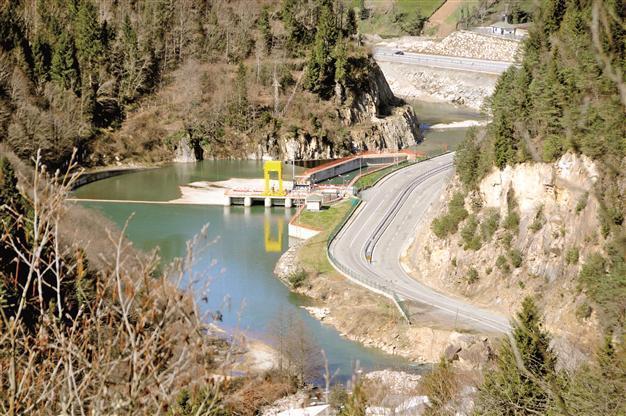Government to ease hydro plant construction for firms
ANKARA - Anatolia News Agency

There are around 32 hydrolectric power plant projects on Ikizidere creek, located at Turkey’s Black Sea province of Rize, arousing environmental opposition. DHA photo
The Turkish government is committed to push forward the building of hydroelectric power plants despite the oppositions based on environmental concerns, as it steps up its efforts to lift bureaucratic obstacles faced by the contractor companies.
“We don’t want the [hydroelectric power plant] investments to be delayed even a day,” Turkey’s Forestry and Water Affairs Minister Veysel Eroğlu said yesterday during a meeting on the subject of “Problems in Hydroelectric Power Plants and Solution Proposals,” in which Turkish Energy Minister Taner Yıldız also participated.
The Forestry Ministry, which was recently empowered to provide permission to licensed hydro-plant investors wishing to use forestry lands, wants to solve the problems faced by companies, Eroğlu said, adding, “some of these demands are acceptable while some of them are not.”
Bureaucracy easedThe biggest complaint from the private sector was bureaucracy, he said, and added that after holding talks with related government parties the ministry had made some progress in eliminating these holdups.“Yesterday I signed 300-350 permits. We handle the transactions fast.” Energy Minister Yıldız, who recently admitted that some of hydroelectric power plants have been built in controversial areas, also underlined the importance of hydro-power plants for Turkey’s energy generation in addition to the private sector’s importance for hydro-plant construction.
Pointing out that the private sector’s share of the total energy production in Turkey had jumped to 64 percent from 34 percent, Yıldız said the government was seeking ways to widen benefits from state resources and was evaluating the alternatives for sharing these resources with the private sector in certain fields. “To come up with solutions to the problems of companies, we can hold meetings with related state departments,” Yıldız said.
“The number of documents has been decreased considerably as one company used to present 52 documents in six folders while now only 22 documents in one folder are required,” he said, adding that they have also speeded up the approval process.
Yıldız also commented on the environmental objections directed at hydroelectric power plants, based on the fact that most of them have a destructive impact on the surrounding environment and wildlife, saying that in fact construction was sensitive to the preservation of cultural and natural assets.
The public might have perceived that we act rightfully, he said, adding that private and public sector parties should cooperate to ensure that all sides we doing so.
The building of hydroelectric power plants has long drawn objections from both locals in areas where the plant was to be built and from environmentalists. Most of these plants have still been built, despite protests. A substantial number of these projects have been stopped with court decision but the government plans to nullify these decisions by passing a draft code which is awaiting parliamentary decision.
